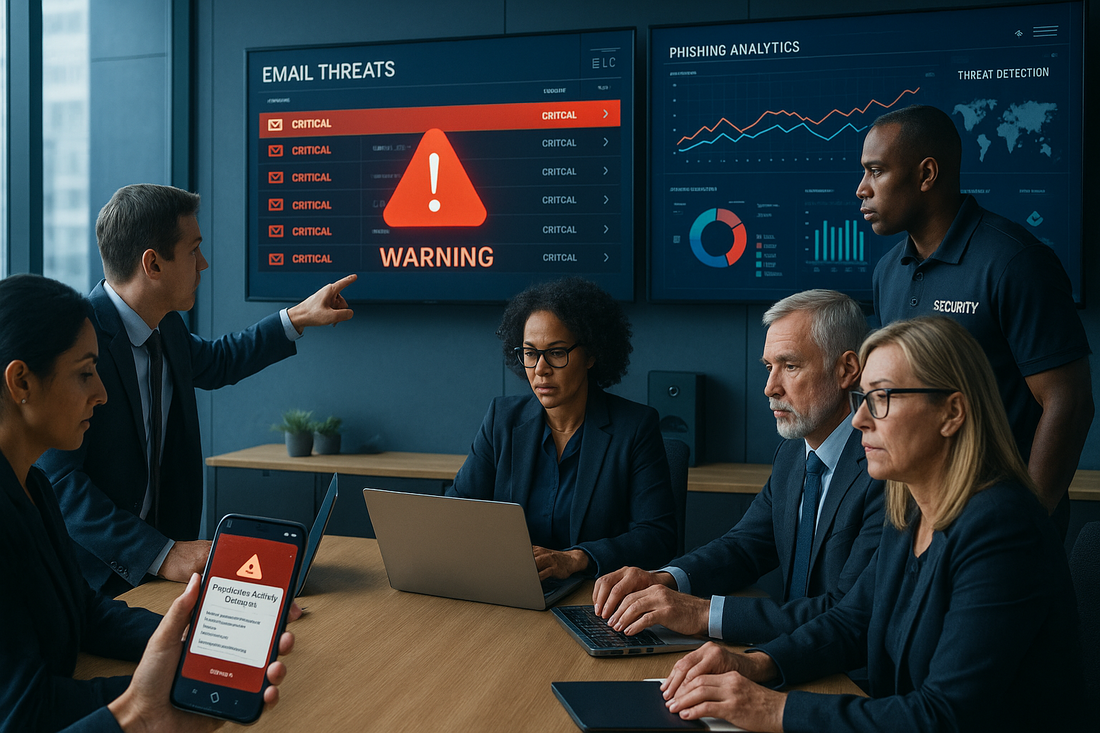
The 2025 Email Security Revolution: What Every Business Owner Needs to Know
Share
The 2025 Email Security Revolution: What Every Business Owner Needs to Know
You know what's wild? Last week I was talking to a manufacturing CEO who told me something that made my blood run cold.
"Dan, we just discovered our competitor has been reading our emails for six months." Six. Months.
This isn't some Hollywood hacker movie. This is happening right now, to businesses just like yours.
The Numbers Don't Lie (And They're Terrifying)
Let me hit you with some data that'll make you want to check your inbox immediately.
AI-powered phishing attacks jumped 1,265% in 2025. Think about that for a second. Not 12%. Not 125%. Over twelve hundred percent. In one year.
But here's the kicker—these aren't your grandfather's spam emails anymore. We're talking about AI systems that can study your writing style for weeks, mimic your CEO's voice perfectly, and create personalized attacks for every single employee.
36.9% of all business emails in 2024 were unwanted, with 2.3% containing actual malicious content. Do the math. If your team processes 1,000 emails a day, 23 of them are actively trying to hurt your business. Twenty-three. Every single day.
What's Really Happening Behind the Scenes
Here's what the cybersecurity industry doesn't want you to know: we're in the middle of an AI arms race, and most businesses are showing up to a gunfight with a butter knife.
The Old Guard is Failing
Traditional email security works by recognizing patterns. "Oh, this looks like that virus we saw last month. Block it."
Problem? Modern malware changes its fingerprint with every single attack. It's like trying to catch a shapeshifter with a photograph from 1995.
The AI Revolution is Here
Meanwhile, the bad guys are using AI that can generate 10,000 unique phishing emails in under an hour, clone voices so perfectly that millions were lost to deepfake CEO calls in 2024, and learn from every failed attack.
I had a client—healthcare company, about 150 employees—who got hit with an AI-generated phishing campaign that referenced their exact patient management software and even the CEO's dog's name.
The Trend Analysis: Where This is All Heading
Look, I've been in cybersecurity for over 30 years. I've seen every trend, every
"revolutionary" technology.
This is different.
Trend #1: The Democratization of Cyber Warfare
Five years ago, you needed a team of expert hackers to pull off a sophisticated email attack. Today? There are AI tools that let a teenager in their basement launch attacks that would make the NSA jealous.
Trend #2: The Personalization Arms Race
We're moving from "spray and pray" attacks to "sniper rifle" precision. AI can now study your company for months, learning who talks to whom, what software you use, your communication patterns. Then it crafts attacks so personalized that even cybersecurity experts fall for them.
Trend #3: The Speed of Evolution
AI-powered attacks are evolving faster than our ability to defend against them. Traditional security updates happen monthly, maybe weekly. AI attacks? They're evolving in real-time. Every blocked attempt makes them smarter. It's like playing chess against an opponent who gets better every single move.
The Industry Response: Fighting Fire with Fire
But here's where it gets interesting. The cybersecurity industry is finally waking up.
The AI Defense Revolution
Smart companies are realizing you can't fight AI with traditional methods. You need AI to fight AI.
Modern cybersecurity solutions now use machine learning to analyze sender behavior patterns in real-time, detect subtle language anomalies that humans miss, and predict attack vectors before they're even launched.
I watched one of these systems catch a phishing attempt that had fooled three different traditional security tools. The AI noticed the sender's typing pattern was 0.3 seconds faster than normal.
The Productivity Revolution
But here's the unexpected twist: the same AI that's revolutionizing security is also revolutionizing productivity.
That manufacturing CEO I mentioned earlier? After implementing AI-powered email management, his team reduced email processing time by 60%, caught 99.7% of threats (up from 73%), and freed up 8 hours per week for actual business work.
"It's like having a personal assistant who never sleeps and never makes mistakes," he told me.
What This Means for Your Business
Here's my prediction: by the end of 2025, there will be two types of businesses. Those using AI-powered email security. And those getting hacked.
Companies that embrace strategic AI consulting for email management aren't just protecting themselves—they're gaining a massive competitive advantage. While their competitors are drowning in email chaos and security breaches, they're making faster decisions and focusing on growth.
Businesses still using traditional email security are sitting ducks. And the cost isn't just financial—though the average email breach costs $4.88 million.
It's the lost opportunities. The damaged relationships. The sleepless nights wondering if your competitor is reading your strategic plans.
The Bottom Line
We're at an inflection point. The email security landscape has fundamentally changed, and there's no going back.
The question isn't whether AI will transform how we handle email. It already has. The question is: will you be leading the charge, or playing catch-up?
Ready to see how AI can transform your email from your biggest vulnerability into your most powerful productivity tool? Join our upcoming AI Business Growth Webinar where we'll show you exactly how forward-thinking business owners are using AI to protect their companies and reclaim their time.
Because in 2025, your email security isn't just about protection—it's about competitive advantage.
